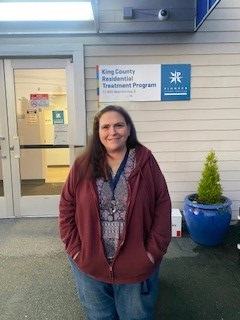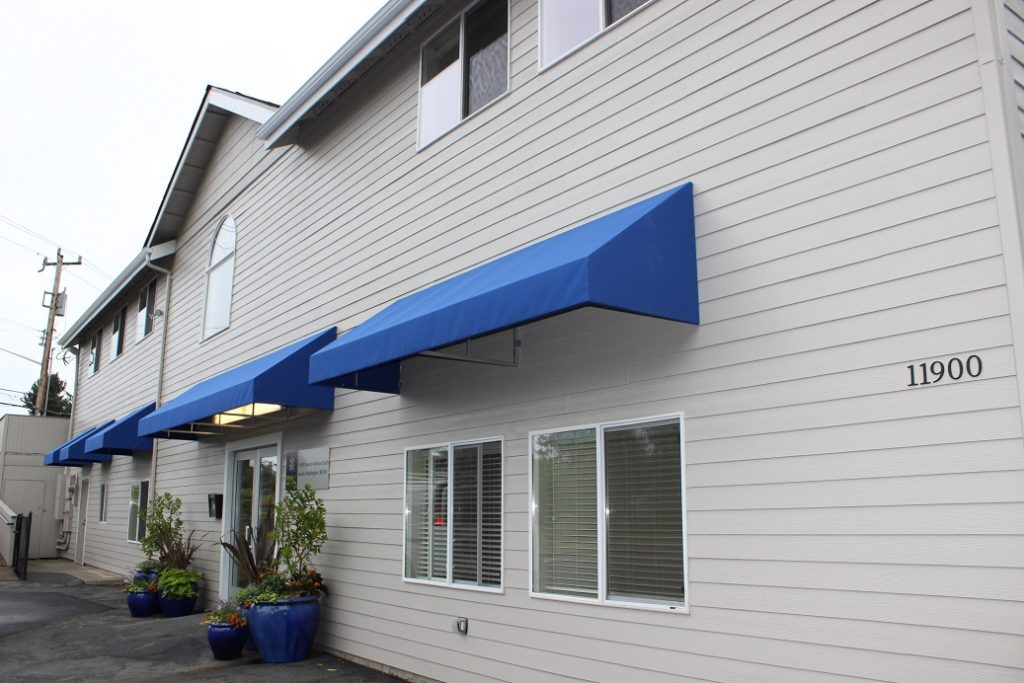Co-occurring Mental Health and Substance Use Treatment Delivers Success for Tara


“It may feel like it’s dark and there is no way out – but there is a way out – and there are people like me, and countless others, who want to help. You are not alone! And yes, recovery is possible!” Tara
——————————————————————————————————————-
Tara works as a health coordinator in our King County Residential Treatment Program in south Seattle. She is also a certified peer support specialist and substance user disorder professional trainee (SUDPT). Tara has come a long way since being a client in our former co-occurring residential treatment program in the same location. Her experience and wisdom on recovery is something that she now shares generously with clients struggling with co-occurring substance use disorders and mental health issues.
Tara didn’t really start drinking until she was 30 years old. She remembers that on her and her twin brother’s birthday she had a few drinks and realized it helped her with her shyness around other people and made her feel less inhibited and self-conscious. At that point she continued to drink socially whenever she could, although she says she already had the obsession and found herself planning social occasions around drinking. Then tragedy struck – her husband passed away leaving her to be the single parent of three children.
“I turned to alcohol and self-medicated after the death of my husband. Every night I was drinking alone after work to cope and I felt it was helping me to fall asleep. What I did not know was that I was not dealing with my fragile mental state that included depression and PTSD.” said Tara.
Tara had been working as a medical assistant, but now as a single mother, she needed different hours so she changed her career and started working for a manufacturer of construction equipment. This allowed her to meet her children when they came home from school.
“In my new position I made new friends that liked to drink socially. In my stressed and trauma-filled state of mind, it did not take long for my drinking to get out of control,” shared Tara.
By 2014, Tara had been in four residential treatment centers. In 2019, Tara ended up in the hospital for over two months suffering from liver and kidney failure due to her heavy consumption of alcohol. Due to her liver failure, she also had a brain infection. This was severe enough to stop her from drinking and when she was released from the hospital she went to outpatient treatment.
However, six months later she relapsed and went on a drinking binge. Her outpatient counselor finally identified that she was struggling with depression that had been a part of her life since she was young, along with PTSD and grief from the death of her husband that had never been addressed.
Tara’s counselor referred her into a former co-occurring (CORP) program that Pioneer operated. At CORP, Tara learned to open up and not be ashamed of her grief and depression. She learned about what the typical symptoms of anxiety and depression were and how to recognize the triggers that set her off to want to self-medicate.
Tara shared, “Finally, a treatment program was addressing my mental health. I was educated on coping techniques and met with a psychiatrist at CORP who helped me talk about my anxiety, depression and trauma, and face why birthdays and anniversaries could be triggers that set me back. The entire staff at CORP worked with me to better understand my behavior. They helped me to move forward on my recovery journey and learn coping skills. They also helped me learn to let go of the guilt and shame that had held me hostage for years. They helped me find my voice again. But most importantly, they helped me find hope.”
After 92 days, Tara graduated from CORP and was released to a clean and sober housing program and participated in Intensive Outpatient (IOP) treatment. She really continued to work on herself by going to a grief counselor and participating in Eye Movement Desensitization and Reprocessing (EMDR), a psychotherapy technique that helps people heal from emotional distress and symptoms caused by disturbing life experiences.
While living in the clean and sober house and working on her recovery, Tara decided to volunteer at a program called Peer Kent. “I wanted to help others now that I was healing. I decided to get involved and share my story to inspire someone else who was struggling. I had a counselor in Pioneer’s former co-occurring program (CORP) who taught me that my story could be my power to help others, not my shame,” Tara stated.
Soon, after, Tara reached out to Pioneer’s CORP and found out about available residential treatment specialist (RTS) positions. “I decided to apply for an RTS position and was hired! When I started work at CORP, I simultaneously went after my peer support certification online through the Washington State Department of Health.” Tara explained.
After CORP closed, Tara was hired as a peer support at the Harborview office-based opioid treatment program. Then, she was recruited to work at Greater Lakes as a peer support for the Felony Mental Health Court program. As her skill set was growing, she heard that Pioneer was opening the King County Residential Treatment Center in the former CORP facility. A Pioneer employee reached out to Tara telling her about the new co-occurring program. Tara was hired to work as a peer support in the new program but soon transitioned to a health coordinator position.
In her position as health coordinator on swing shift, Tara is in charge of medication management and the physical health of clients. She also facilitates peer activity groups, spends time on floor with clients and runs art projects as a certified peer support staff member.
Tara is in the process of pursuing her substance use disorder professional trainee (SUDPT) certification at Highline College. She is taking weekend classes that fit around her swing work shifts at the King County Residential Treatment Program.
“It is a great feeling to be working back at the former CORP facility where I learned to let go of my shame and guilt that haunted me over the years. I work with a compassionate team of people and get the opportunity to use my education to serve others,” shared Tara.
Tara continued, “My grown kids are so proud of me and very supportive. In my earlier years when I was in the middle of my addiction and hospitalized, my children were terrified that I was going to die. Now, we have built back up our relationship and they come to me for “mom stuff” and it feels great that I can support them and be present for my grandkids as well. My life is far better than I could have imagined that day that I walked into CORP. I went from hopeless and alone to being surrounded by support and love, understanding now that recovery is possible, even for me.”
